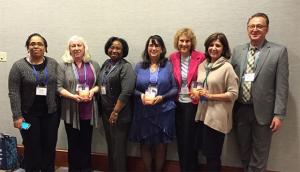School of Social Work's resource center honored for national excellence
University of Hawaiʻi at MānoaHā Kūpuna, the National Resource Center for Native Hawaiian Elders located in the Myron B. Thompson School of Social Work at UH Mānoa, was recently honored with the Award for Excellence in Multicultural Aging by The American Society on Aging.
Hā Kūpuna’s work speaks to the giving of ha, or breath of life, from the older to younger generations. In Native Hawaiian culture, kūpuna traditionally are recognized as the major sources of wisdom and the transmitters of knowledge and training to younger generations. In order to provide kūpuna with the opportunity to pass ha to younger generations, consideration must be given to the promotion of their well-being, health and access to long-term care. The goal of Hā Kūpuna is to improve access to and delivery of services to Native Hawaiian elders and their caregivers through the development and dissemination of knowledge around health and long-term care patterns and preferences.
“We are thrilled by this prestigious national recognition," said Dean Noreen Mokuau of the Myron B. Thompson School of Social Work. "We have distinguished faculty leaders in Hā Kūpuna who work with our students and community partners to tenaciously promote the health and well-being of Native Hawaiian elders and their ʻʻohana.”
Hā Kūpuna is one of only three federally funded centers for native elders. Hā Kūpuna is funded by the U.S. Administration on Aging (AoA) and the Department of Health and Human Services.
Shared Hā Kūpuna Principal Investigator Dr. Colette V. Browne, “We were pleased to accept, together with our partner national resource centers for native elders at the University of North Dakota and the University of Alaska, the Award for Excellence in Multicultural Aging from the American Society on Aging (ASA). The ASA is the nation's largest professional association in aging. Recognition of the work of Hā Kūpuna, National Resource Center for Native Hawaiian Elders, signals an increased awareness of the social and health disparities faced by native elders, and the need for continued research and policies to alleviate them.”
The mission of the Myron B. Thompson School of Social Work is to provide educational excellence that advances social work with its focus on social justice. The principal responsibility is the generation, transmission, and application of knowledge for the global enterprise with special attention to Native Hawaiian, other Pacific Islander, and Asian populations in our state and region.
For more information visit: http://manoa.hawaii.edu/hakupuna/index.html and http://www.hawaii.edu/sswork/.
(Full caption information for group photo, from left):
Cecelia Aldridge, Program Officer, Office for American Indian, Alaska Native and Native Hawaiian Older Adult Programs, Administration for Community Living/AoA, Washington D.C.
Dr. Paula Carter, Director, National Resource Center for Native American Aging, University of North Dakota, South Fork, North Dakota.
Karen Lowe Graham, Rush University Medical Center, Alzheimer's Program and Center.
Dr. Nancy Furlow, Director, National Resource Center for American Indian Alaska Native and Native Hawaiian Elders, University of Alaska at Anchorage.
Dr. Kathryn Braun, Professor and Co-Principal Investigator, Hā Kūpuna National Resource Center for Native Hawaiian Elders, University of Hawaiʻi at Mānoa, School of Social Work.
Dr. Colette Browne, Professor and Principal Investigator, Hā Kūpuna National Resource Center for Native Hawaiian Elders.
Robert Stein, President and CEO, American Society on Aging, San Francisco, California.

